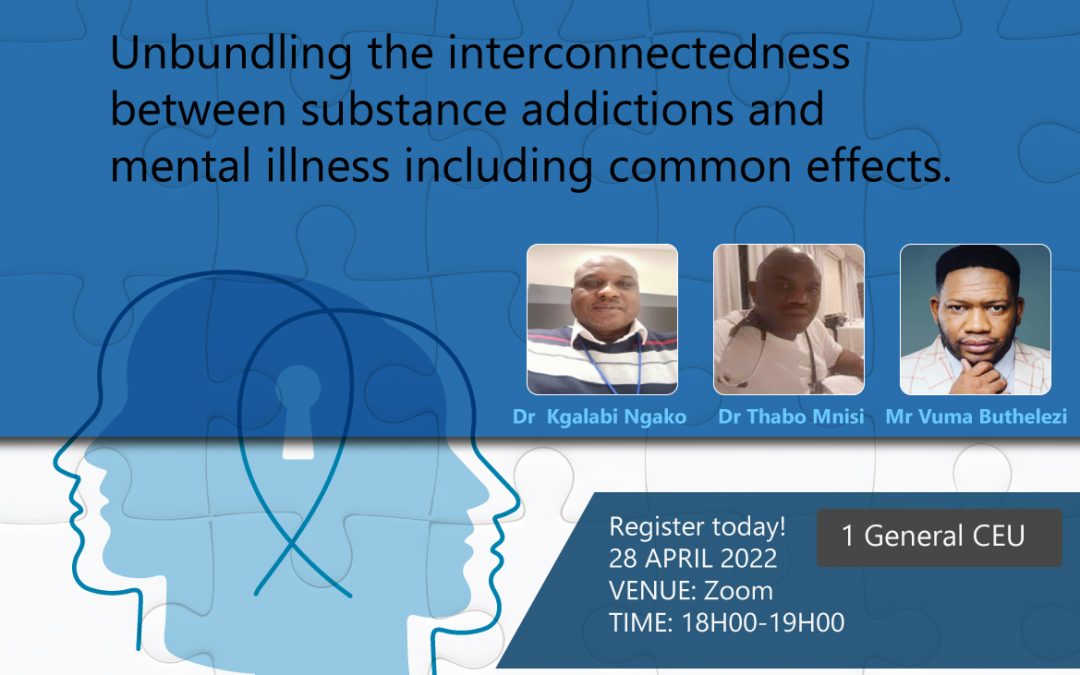
SASCP Roundtable: Unbundling the interconnectedness between substance addictions and mental illness including common effects.
About this roundtable:
Purpose: To have a roundtable discussion that explores the interrelatedness and the network effects of substance abuse and mental illness. Mental illness and addiction both result in manifestation of behavioural, psychological, or bio-neurological dysfunction in an individual. In an article by Hanna Ritchie (2018), it is estimated that around one billion people globally have a mental or substance use disorder. Mental health can incorporate a range of different but sometimes connected disorders such as depression, anxiety, bipolar, eating disorders, schizophrenia, and alcohol and drug use disorders.
Problem Statement: The subtleties of signs and symptoms of mental illness and addiction might lead to misdiagnosis or dual diagnosis in psychotherapy as they both present with cognitive and psychoneurological impairments. A need to understand dual diagnosis and systematic review of outcomes in therapeutic settings.
Motivation for the Discussion: The dialogue seeks to create a discourse for mental health discussion on psychological, biological and neurological effects of substance abuse. The prevalent use of over the counter prescriptions/ medications to hard-core street drugs such as “woonga and nyaope” has created a dangerous ground for mental health problems in both urban and rural areas in South Africa. The effects of substance dependency have a resultant susceptibility to personality, cognitive, mood and mental health disorders including death. These addictions alter brain composition and function, genetic vulnerabilities, cause psychosocial dysfunction and exposure to stress or trauma. Furthermore an upsurge to substance excess use/abuse lead to psychological ill health, anxiety, criminal activities, violent behaviour and suicide. There is a need for contemporary clinical psychologists to raise the standard in treatment modalities. The rising epidemic and the indications of abusers getting younger and younger, makes an opportunity for clinical psychologists in South Africa to engage and bring about diverse treatment modalities. The ripple effects of substance abuse from individual to families and communities calls for an empirical focus and adaptation for practitioners to have a broader therapy focus.
Meet our Presenters!
Dr Kgalabi Ngako is a Deputy Director at National Department of Health dealing with Policy for substance abuse. Previously a deputy director responsible for monitoring and evaluation and as a project manager in South African Medical Research Council ( Alcohol , Tobacco and other drug Research Unit. He had publications on substance abuse in peer reviewed scientific journals Mr Ngako has a Doctorate in Health studies from UNISA and Certificate on media based prevention science from Claremont Graduate university
Dr Thabo Mnisi is a Specialist Family Physician at 1Military Hospital. He holds the following qualifications: MBChB, FCFP, M. Med (Fam Med). PGDDS, PSc. Med Law. MBL. Dr Mnisi is involved in research unit on HIV. He is also teaching and doing private clinical work. He has been involved with communities on mental health, substance abuse, youth development and a speaker in different forums covering diverse topics.
Mr Vuma Buthelezi has been a radio presenter and on air presenter since 2008 to date; from Durban youth Radio to Gagasi FM. He is also a lecturer at Creative Arts College Digify Africa media and a vice tutor. An artist , DJ, master of ceremonies, Magazine editor and radio presenter for diverse sessions: Breakfast; midday; sundowner; mix, urban; and eclectic drive. His interest involve engaging with listeners on topics that affects communities. He create awareness on many issues including mental illness.















